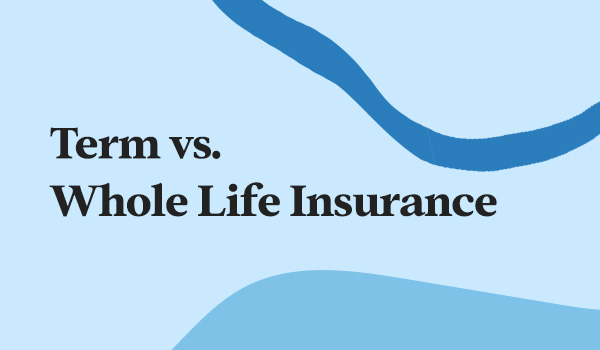When looking to purchase life insurance, you’ll encounter two main types: Term Life vs. Whole Life Insurance. While both provide a death benefit to your beneficiaries if you pass away, they work very differently. So, understanding the key differences between term and whole life insurance can help you decide which policy makes more sense for your needs and budget.
What is Term Life Insurance?
Term life insurance provides pure death benefit protection for a set period of time, or “term.” Terms can range from 1 year to 30 years. The death benefit is paid to your beneficiaries if you die within the term.
If you outlive the term, the policy simply terminates and no death benefit is paid.
The advantages of term life insurance include:
- Lower cost: Term policies typically have much lower premiums compared to whole life for the same death benefit amount. This makes term life very budget-friendly.
- Customizable terms: You can match the term length to your specific need, such as covering your working years.
- Option to renew: Many term policies allow you to renew for another term without a medical exam.
- Higher death benefits: For the same premium, term life provides substantially higher death benefit coverage than whole life.
The main disadvantages are that term insurance only lasts for the predefined term, and premiums increase as you age. There is no cash value accumulation with term policies.
What is Whole Life Insurance?
Whole life insurance provides lifetime protection as long as you pay the premiums. The policy has a cash value component that builds over time in addition to the death benefit. The cash value earns interest at a guaranteed rate specified by the insurance company.
The advantages of whole life insurance are:
- Lifetime coverage: The policy remains in force as long as premiums are paid.
- Stable premiums: Premiums are fixed and guaranteed not to increase.
However, whole life also has some drawbacks:
- Higher premiums: Premiums are typically 6-10x higher than term life premiums.
- Lower death benefit: For the same premium as a term, the death benefit will be much lower.
- Less flexible: There are usually penalties for reducing or stopping premium payments.
- Lower cash value growth: Interest rates earned on the cash value tend to be lower than alternative investments.
Key Differences Between Term and Whole Life
Here is a quick overview of how term life and whole life compare:
- Coverage duration: Term is temporary; whole life is permanent as long as you pay premiums
- Premiums: Term premiums start low and then increase; whole-life premiums remain fixed
- Death benefit: Term policies have higher death benefits for the premium
- Cash value: Term has no cash value; whole life builds tax-deferred cash value that earns interest
- Flexibility: Term allows customizable terms; whole lifeless flexible in changing face amounts or stopping premiums
- Costs: Term is significantly less expensive; whole-life premiums are much higher
- Uses: Term works well for temporary needs like family protection; whole life is better for lifelong coverage and cash accumulation
Which is Right for You?
Term and whole life insurance are suited for different financial situations and goals. Consider your budget, whether you need lifelong coverage or just temporary protection, and your desire to accumulate cash value.
Here are some quick guidelines:
- Term life insurance tends to work well for temporary family income replacement needs, covering mortgages, young family expenses, and income protection during your working years. It offers affordability and customization of terms.
- Whole life insurance is better for permanent family income replacement or estate planning needs. It can cover lifelong insurance needs beyond working years. The cash value build-up can also supplement retirement savings.
- If you’re a budget-minded family needing basic coverage, term life insurance generally provides the most cost-effective option.
- If you want both death benefit protection and tax-advantaged cash value growth, whole life insurance may be a better solution.
Here, the choice depends on assessing your specific situation. Many families opt for a combination of term and whole life insurance at different stages of life.
However, working with a financial advisor can help ensure you get the right life insurance solutions for your circumstances.
Read More- ICICI Pru Saral Jeevan Bima – Provide Financial Protection for Your Family

